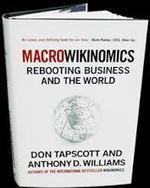Macrowikinomics is the story of a world with two starkly contrasting realities. On the one hand, many of the institutions that have served us well for decades, even centuries, seemfrozen and unable to move forward.
Research and publish the best content.
Get Started for FREE
Sign up with Facebook Sign up with X
I don't have a Facebook or a X account
Already have an account: Login
on peer-to-peer dynamics in politics, the economy and organizations
Curated by
jean lievens
 Your new post is loading... Your new post is loading...
|
|













